Hugo Houle poursuit son travail d’équipier modèle
Montréal, 20 juin 2025 (Sportcom) – L’échappée de trois coureurs a été rattrapée à un kilomètre de la ligne d’arrivée vendredi lors…
Judo Canada - Jeux olympiques de Tokyo
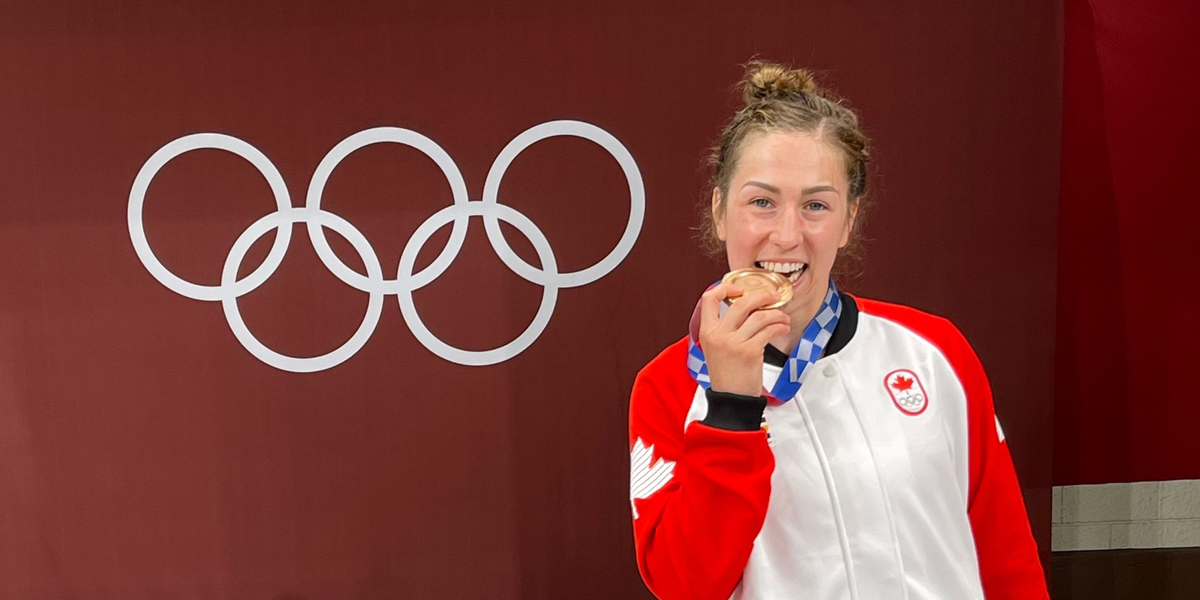
Catherine Beauchemin-Pinard, médaillée de bronze des Jeux de Tokyo. (photo Judo Canada)
Montréal, 27 juillet 2021 – C’était aujourd’hui au tour de Catherine Beauchemin-Pinard de laisser sa marque indélébile dans le grand livre du judo canadien en s’emparant d’une médaille de bronze olympique chez les moins de 63 kg. Tokyo 2020 devient ainsi les premiers Jeux olympiques où les représentants de l’unifolié récoltent deux médailles, exactement au même endroit où la première s’est gagnée, par Doug Roger, il y 56 ans.
« C’est une journée incroyable, presque parfaite. J’ai pris du temps pour réaliser que j’étais médaillée olympique. Ç’a été un très long combat, donc j’étais vraiment contente d’avoir réussi à pousser jusqu’au bout. Ça m’a fait du bien de voir Antoine Valois-Fortier, Arthur Margelidon et Sasha Mehmedovic après ma victoire. J’étais submergée d’émotions et j’avais de la difficulté à comprendre tout ce qui se passait », a déclaré Beauchemin-Pinard, le sourire dans la voix, après avoir reçu sa médaille.
La Montréalaise a remporté sa médaille de bronze en battant la Vénézuélienne Anriquelis Barrios par waza-ari, en temps supplémentaire.
Quelques minutes plus tôt, elle avait été privée de la grande finale en rencontrant sur son chemin la Française Clarisse Agbegnenou. La charge était lourde lors de cette demi-finale contre la quintuple championne du monde. Beauchemin-Pinard s’est ardemment battue jusqu’à la dernière seconde, mais s’est finalement inclinée par waza-ari.
« Je voulais contrôler son côté gauche, c’était ma stratégie, mais elle a vraiment été forte aujourd’hui. Elle mérite sa médaille d’or. »
La Française a défait la Slovène Tina Trstenjak en finale pour remporter l’or.
La championne olympique a par ailleurs pris le temps d’encenser Beauchemin-Pinard en conférence de presse après la compétition. Agbegnenou a vanté le caractère de battante de la Québécoise ainsi que sa combativité au cours des derniers mois.
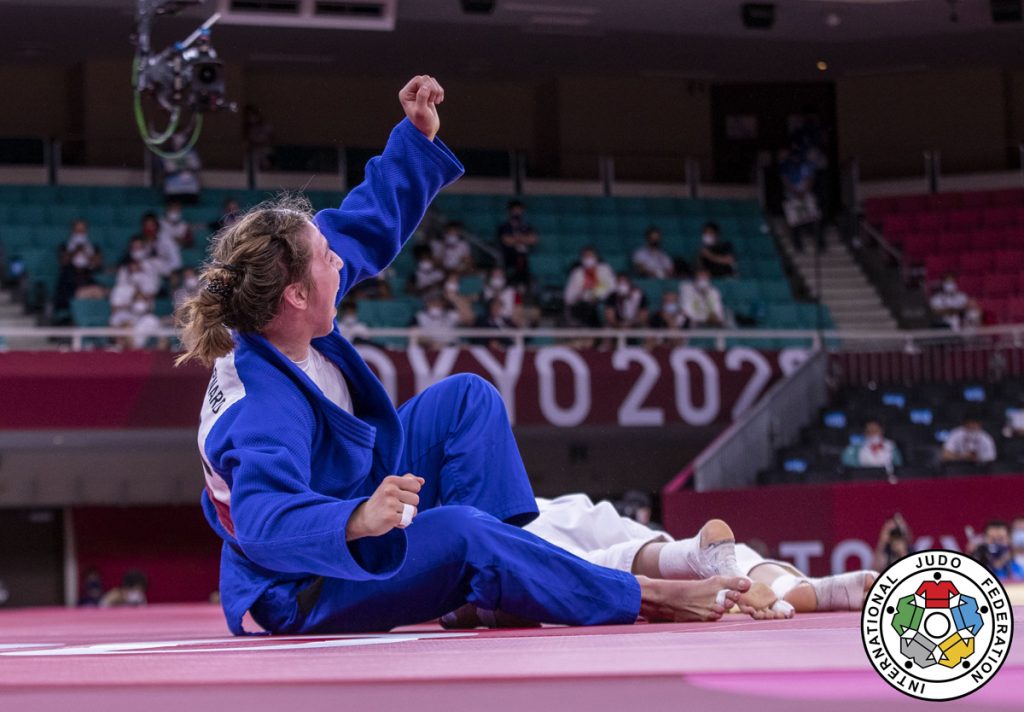
Trois premiers affrontements déterminants
En début de parcours, Beauchemin-Pinard a été intraitable lors de ses trois premiers combats. Elle s’est d’abord imposée par ippon contre la Danoise Laerke Olsen puis a pris le contrôle très rapidement face à l’Autrichienne Magdalena Krssakova en huitièmes de finale, réglant son sort en 38 secondes.
La Brésilienne Ketleyn Quadros a été sa victime suivante en quarts de finale. Beauchemin-Pinard l’a battue par la combinaison de deux waza-ari, s’offrant un ippon avec moins d’une minute à faire.
« Le stress était présent dans mon premier combat, Olsen était très bien préparée, sa défensive était impeccable. J’étais contente de trouver une faille dans sa tactique pour la faire tomber. J’ai été surprise d’avoir été aussi expéditive dans mon deuxième combat. Finalement, contre la Brésilienne, j’étais prête. Quand j’ai vu une opportunité d’attaque je n’ai pas hésité et j’ai gagné de cette manière. »
Au terme de son tournoi, la judoka de 27 ans a ainsi réussi à imiter sa compatriote Jessica Klimkait qui a remporté une médaille de bronze lundi chez les moins de 57 kg. Klimkait et Beauchemin-Pinard deviennent ainsi les deux premières femmes canadiennes à monter sur un podium olympique en judo, en plus de combiner ensemble un autre fait historique en cumulant deux médailles à la même édition des Jeux olympiques.
« Ce sont les meilleurs Jeux olympiques de Judo Canada avec nos médailles de bronze et la cinquième place d’Arthur Margelidon, il ne faut pas l’oublier. Je suis contente de marquer l’histoire et personnellement, ça va me marquer à vie. »
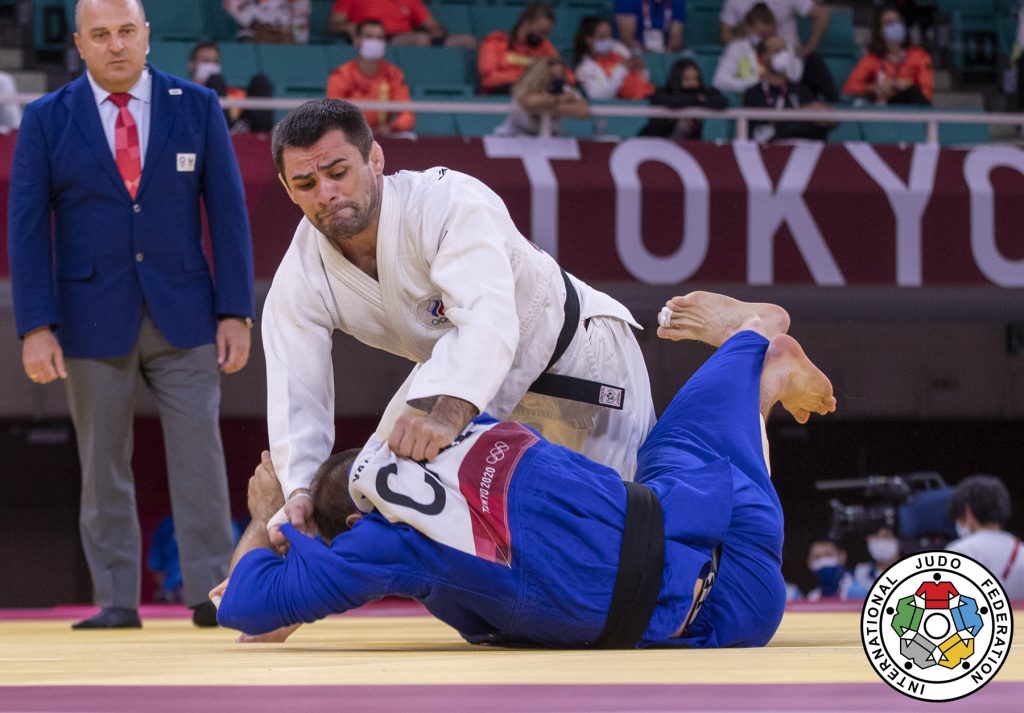
Antoine Valois-Fortier s’incline en huitièmes de finale
Le parcours d’Antoine Valois-Fortier chez les moins de 81 kg s’est pour sa part arrêté plus tôt qu’espéré alors qu’il a été battu en huitièmes de finale par le Russe Alan Khubetsov par waza-ari.
« Évidemment, j’aurais bien aimé passer Khubetsov. Je l’avais déjà battu avant donc je savais que j’en étais capable. Mon plan de match était bien établi, je voulais mettre ma main droite sur son revers pour garder la distance, mais dans la première minute, j’ai compris que son objectif était de m’empêcher de poser cette main à cet endroit. Je n’ai pas eu le temps de m’adapter avant qu’il marque un point. »
Le waza-ari de Khubetsov est survenu 23 secondes seulement après le début du combat. Valois-Fortier a alors dû redoubler d’ardeur pour tenter d’égaler le pointage, mais en vain.
« J’ai couru après longtemps. À un moment, je pense avoir été très près de marquer en le bousculant sur le côté, mais malheureusement, ça n’a pas compté. La balle était dans mon camp, il fallait que j’y aille all-in pour aller chercher un point. »
La journée de travail du judoka de 31 ans avait bien commencé avec une victoire face au Grec Alexios Ntanatsidis après que ce dernier ait reçu trois pénalités. Le combat a été fort en intensité, mais Valois-Fortier ne croit pas avoir perdu trop d’énergie dans ce premier combat.
« Je n’ai pas senti que j’avais manqué d’énergie. J’ai eu un bon temps de récupération entre les combats. On s’entraîne pour être capable d’enchaîner les combats difficiles dans une même journée. »
L’athlète originaire de Québec participait à ses troisièmes Jeux olympiques. Après une médaille de bronze à Londres en 2012 et une septième place à Rio en 2016, il voulait vivre pleinement l’expérience de Tokyo sans avoir de pression inutile sur ses épaules.
« Je me sens plus serein qu’à Rio. Je ne le cacherai pas par contre, je suis déçu de ma journée. Les cinq dernières années ont été assez exigeantes. Je suis déçu, mais très content du chemin que j’ai parcouru. »
Est-ce qu’il s’agissait du dernier combat de la carrière du Québécois? Encore trop tôt pour répondre à cette question alors que Valois-Fortier veut prendre le temps d’y réfléchir dans les prochaines semaines avec son entraîneur Nicolas Gill.
« Je n’ai pas encore pris de décisions pour la suite des choses. Pour le moment, je veux me reposer, encourager mes coéquipiers et profiter de tout ce dont je n’ai pas pu profiter dans les derniers mois. »
La médaille d’or a été remportée par le Japonais Takanori Nagase, qui a battu le Mongol Saeid Mollaei par waza-ari en grande finale.
Shady Elnahas sera le dernier Canadien à fouler les tatamis du Nippon Budokan aux Jeux olympiques de Tokyo jeudi, le 29 juillet. L’Ontarien se mesurera à Ivan Remarenco des Émirats arabes unis au premier tour chez les moins de 100 kg.
-30-
Rédigé par Sportcom pour Judo Canada
Source :
Patrick Esparbès
Directeur général adjoint
Judo Canada
(514) 668-6279
p.esparbes@judocanada.org
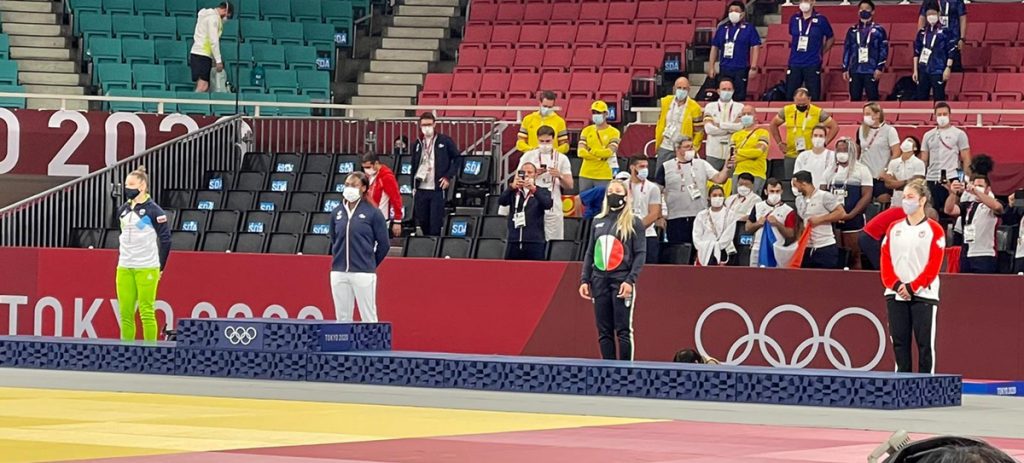
Montréal, July 27, 2021 – Today, it was Catherine Beauchemin-Pinard’s turn to leave her mark on Canadian judo history by winning an Olympic bronze medal in the under-63 kg category. The Tokyo 2020 Games will therefore be remembered as the first Olympics where Canada won two judo medals, in the same location that Doug Roger won the country’s first, 56 years ago.
“It was an incredible day, almost perfect. It took me a minute to realize that I’m now an Olympic medallist. It was a long battle, so I was really happy to be able to push through to the end. And I was very glad to see Antoine Valois-Fortier, Arthur Margelidon and Sasha Mehmedovic after my win. I was feeling a bit overwhelmed and was having trouble understanding what was going on,” stated Beauchemin-Pinard with a smile in her voice after receiving her medal.
The Montrealer beat Venezuela’s Anriquelis Barrios by waza-ari in overtime to snag the bronze medal.
A few minutes earlier, she had been denied her spot in the gold medal final by France’s Clarisse Agbegnenou. She had faced a tough battle against the five-time world champion and had fought hard until the last second, but eventually bowed out by waza-ari.
“I wanted to control her left side, that was my strategy, but she was really strong today. She deserved the gold.”
In the gold medal final, Agbegnenou defeated Slovenia’s Tina Trstenjak to earn the top spot on the podium.
She also took the time to commend Beauchemin-Pinard during a post-event press conference. She praised the Québécoise’s fighting spirit, as well as her combativeness over the past few months.
Three Decisive Early Bouts
Beauchemin-Pinard was unstoppable in her first three rounds. She began with a victory by ippon over Denmark’s Laerke Olsen, then quickly took control of her match against Austria’s Magdalena Krssakova in the round of 16, deciding her fate in 38 seconds.
Her next victim was Brazil’s Ketleyn Quadros in the quarter-final. Beauchemin-Pinard defeated Quadros by a double waza-ari combo, scoring an ippon with less than a minute to go.
“I felt some stress in my first match. Olsen was very well-prepared, and her defence was flawless. I was glad to find a chink in her armour and get her on the ground. In my second bout, I was surprised to be able to end it so quickly. Finally, against the Brazilian, I felt ready. When I saw an opportunity to attack, I didn’t hesitate, and that’s how I won.”
To close out her tournament, the 27-year-old succeeded in emulating her countrymate Jessica Klimkait, who won a bronze medal in the under-57 kg category yesterday. Klimkait and Beauchemin-Pinard are the first two Canadian women to climb onto the Olympic podium in judo. Together, they also made history by claiming two judo medals for the country at the same Olympic Games.
“We can’t forget that these are Judo Canada’s best Olympics ever, with two bronze medals and Arthur Margelidon’s fifth-place finish. I’m very happy to be a part of history, and personally, this will stay with me for life.”
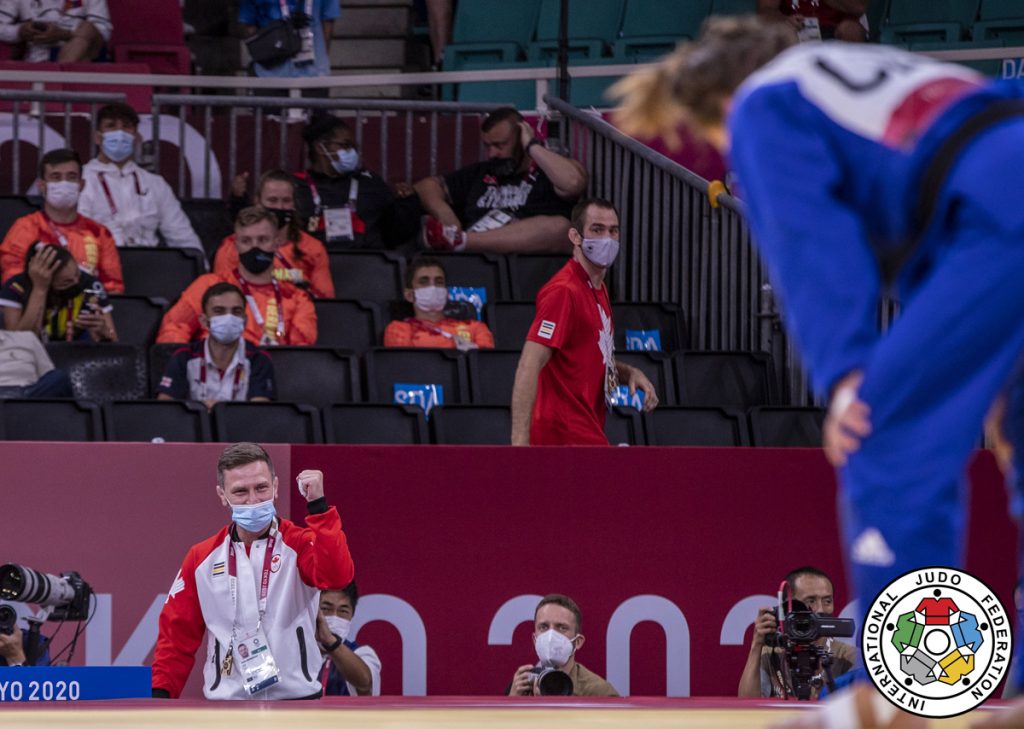
Antoine Valois-Fortier Eliminated in Round of Sixteen
Antoine Valois-Fortier’s run in the under-81 kg category came to an earlier end than expected when he was defeated by waza-ari by Russia’s Alan Khubetsov in the round of 16.
“Obviously, I would have liked to get past Khubetsov. I’ve beaten him in the past, so I knew I was capable of it. I had a good game plan. I wanted to get my right hand on his backhand side to keep some distance between us, but in the first minute, I caught on that his goal was to prevent me from placing my hand there. I didn’t get the chance to adapt my approach before he scored.”
Khubetsov scored the waza-ari only 23 seconds into the bout. Valois-Fortier therefore had to fight even harder to even the score, but his efforts were in vain.
“I chased him for a long time. At one point, I think I came close to scoring by shoving him to the side, but unfortunately, it didn’t count. The ball was in my court. I had to go all-in if I wanted to score.”
The 31-year-old judoka’s day started well with a victory over Greece’s Alexios Ntanatsidis, after the latter received three penalties. It was a tough match, but Valois-Fortier believes he did not expend too much energy in his first round.
“I didn’t feel like I was running out of energy. I had a lot of good recovery time between fights. We train to be able to handle several tough matches in a day.”
This was the Quebec City native’s third Olympic appearance. After a bronze medal in London in 2012 and a seventh-place finish in Rio in 2016, he wanted to experience the Tokyo Games to the fullest, without feeling unnecessary pressure.
“I feel more serene than I did in Rio, but I won’t deny that I’m disappointed in my day. The past five years have been very demanding. I’m disappointed, but happy with the distance I’ve covered.”
Was this the final fight of Valois-Fortier’s career? It’s still too early to answer that question, but Valois-Fortier will take some time to reflect upon it over the next few weeks with his coach Nicolas Gill.
“I haven’t made any decisions about what’s next. For now, I want to rest, cheer on my teammates and enjoy everything I’ve been denied over the past few months.”
In the under-81 kg category, the gold medal went to Japan’s Takanori Nagase, who beat Mongolia’s Saeid Mollaei by waza-ari in the final.
Shady El-Nahas will be the final Canadian to hit the tatamis of the Nippon Budokan at the Tokyo Olympic Games on Thursday, July 29. The Ontarian will face Ivan Remarenco of the United Arab Emirates in the first round of the under-100 kg class.
-30-
Written by Sportcom for Judo Canada
Source:
Patrick Esparbès
Chief Operating Officer
Judo Canada
(514) 668-6279
p.esparbes@judocanada.org
Montréal, 20 juin 2025 (Sportcom) – L’échappée de trois coureurs a été rattrapée à un kilomètre de la ligne d’arrivée vendredi lors…
Montréal, 8 juin 2025 (Sportcom) – Les principaux prétendants ont donné le ton lors de la première étape du 77e Critérium du…
Montréal, 12 juin 2025 (Sportcom) – Après un passage de cinq ans en Europe où elle a réalisé son rêve de vivre…
Montréal, 16 juin 2025 (Sportcom) – Après une année loin des compétitions internationales où elle a étudié la sociologie à l’Université de…